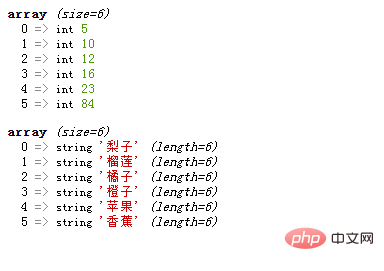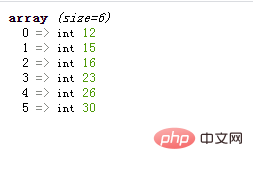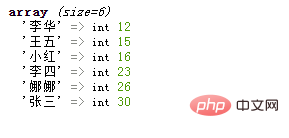 Backend Development
Backend Development
 PHP Tutorial
PHP Tutorial
 Tips for learning PHP arrays: Use array functions to sort arrays in ascending order!
Tips for learning PHP arrays: Use array functions to sort arrays in ascending order!
Tips for learning PHP arrays: Use array functions to sort arrays in ascending order!
Array sorting is a common operation in arrays (another common operation is looping, which was introduced in the previous article. If you are interested, you can check out "PHP Loop Learning 4: How to use the foreach statement to traverse and modify an array Element》), which sorts the elements inside the array, can manage data effectively and reasonably, and improve the execution efficiency of the program.
Today we will take a look at the ascending operation in array sorting, introduce several array functions that can be sorted in ascending order, and use code examples to show how these array sorting functions perform ascending sorting. (Attachment: PHP function array array function video explanation)
There are three commonly used ascending array sorting functions in PHP:
sort() : Sort the array elements in ascending order
asort(): Sort the array in ascending order according to the key value of the associated array
ksort() : Sort the array in ascending order according to the key name of the associated array
1. Use the sort() function
sort() function to sort the array The elements are sorted in ascending order (small to large, low to high).
<?php
header("Content-type:text/html;charset=utf-8");
$arr1 = array(10, 23, 5, 12, 84, 16);
sort($arr1);
var_dump($arr1);
$arr2= array("香蕉","苹果","梨子","橙子","橘子","榴莲");
sort($arr2);
var_dump($arr2);
?>Output:

Output result:sort() function has two parameters: $array (required) and $sortingtype (can be omitted ).
Among them, the $sortingtype parameter is used to define the function sorting mode and specify how to compare the elements/items of the array. The default value is "SORT_REGULAR".
The $sortingtype parameter can be set to the following values:
0 = SORT_REGULAR: Compare array elements normally without changing their type (default value);
1 = SORT_NUMERIC: Treat array elements as numbers;
- ##2 = SORT_STRING: Treat array elements as strings;
- 3 = SORT_LOCALE_STRING: Compare array elements as strings based on the current locale (can be changed via setlocale()).
- 4 = SORT_NATURAL: Similar to natsort(), it sorts strings in "natural order" for each array element. It is new in PHP5.4.0.
- 5 = SORT_FLAG_CASE: Can be combined with SORT_STRING or SORT_NATURAL (OR bitwise operation), case-insensitive sorting string.
<?php header("Content-type:text/html;charset=utf-8"); $arr1 = array(10, 23, 5, 12, 84, 16); sort($arr1,2); var_dump($arr1); $arr2= array("香蕉","苹果","梨子","橙子","橘子","榴莲"); sort($arr2,1); var_dump($arr2); ?>Copy after login

<?php
header("Content-type:text/html;charset=utf-8");
$age = array("张三"=>30,"李四"=>23,"王五"=>15,"李华"=>12,"娜娜"=>26,"小红"=>16);
sort($age);
var_dump($age);
?>
2. Use the asort() function
The asort() function will sort the associative array in ascending order based on the key values and will not modify the key names in the original array. .header("Content-type:text/html;charset=utf-8");
$age = array("张三"=>30,"李四"=>23,"王五"=>15,"李华"=>12,"娜娜"=>26,"小红"=>16);
asort($age);
var_dump($age);
?>
asort() function also has two parameters, the parameter values are the same as the sort() function, you can refer to.
3. Use the ksort() function
The ksort() function will sort the associated array in ascending order according to the key name, and will not modify the original array. key name.<?php
header("Content-type:text/html;charset=utf-8");
$age = array("张三"=>30,"李四"=>23,"王五"=>15,"李华"=>12,"娜娜"=>26,"小红"=>16);
ksort($age);
var_dump($age);
?>##
<?php
header("Content-type:text/html;charset=utf-8");
$arr= array("l"=>"lemon", "o"=>"orange", "b"=>"banana", "a"=>"apple");
ksort($arr);
var_dump($arr);
?> Output:
Output: 
Recommended:《
PHP interview questions summary (collection)》《php video tutorial》
The above is the detailed content of Tips for learning PHP arrays: Use array functions to sort arrays in ascending order!. For more information, please follow other related articles on the PHP Chinese website!

Hot AI Tools

Undresser.AI Undress
AI-powered app for creating realistic nude photos

AI Clothes Remover
Online AI tool for removing clothes from photos.

Undress AI Tool
Undress images for free

Clothoff.io
AI clothes remover

Video Face Swap
Swap faces in any video effortlessly with our completely free AI face swap tool!

Hot Article

Hot Tools

Notepad++7.3.1
Easy-to-use and free code editor

SublimeText3 Chinese version
Chinese version, very easy to use

Zend Studio 13.0.1
Powerful PHP integrated development environment

Dreamweaver CS6
Visual web development tools

SublimeText3 Mac version
God-level code editing software (SublimeText3)

Hot Topics
 PHP 8.4 Installation and Upgrade guide for Ubuntu and Debian
Dec 24, 2024 pm 04:42 PM
PHP 8.4 Installation and Upgrade guide for Ubuntu and Debian
Dec 24, 2024 pm 04:42 PM
PHP 8.4 brings several new features, security improvements, and performance improvements with healthy amounts of feature deprecations and removals. This guide explains how to install PHP 8.4 or upgrade to PHP 8.4 on Ubuntu, Debian, or their derivati
 7 PHP Functions I Regret I Didn't Know Before
Nov 13, 2024 am 09:42 AM
7 PHP Functions I Regret I Didn't Know Before
Nov 13, 2024 am 09:42 AM
If you are an experienced PHP developer, you might have the feeling that you’ve been there and done that already.You have developed a significant number of applications, debugged millions of lines of code, and tweaked a bunch of scripts to achieve op
 How To Set Up Visual Studio Code (VS Code) for PHP Development
Dec 20, 2024 am 11:31 AM
How To Set Up Visual Studio Code (VS Code) for PHP Development
Dec 20, 2024 am 11:31 AM
Visual Studio Code, also known as VS Code, is a free source code editor — or integrated development environment (IDE) — available for all major operating systems. With a large collection of extensions for many programming languages, VS Code can be c
 Explain JSON Web Tokens (JWT) and their use case in PHP APIs.
Apr 05, 2025 am 12:04 AM
Explain JSON Web Tokens (JWT) and their use case in PHP APIs.
Apr 05, 2025 am 12:04 AM
JWT is an open standard based on JSON, used to securely transmit information between parties, mainly for identity authentication and information exchange. 1. JWT consists of three parts: Header, Payload and Signature. 2. The working principle of JWT includes three steps: generating JWT, verifying JWT and parsing Payload. 3. When using JWT for authentication in PHP, JWT can be generated and verified, and user role and permission information can be included in advanced usage. 4. Common errors include signature verification failure, token expiration, and payload oversized. Debugging skills include using debugging tools and logging. 5. Performance optimization and best practices include using appropriate signature algorithms, setting validity periods reasonably,
 PHP Program to Count Vowels in a String
Feb 07, 2025 pm 12:12 PM
PHP Program to Count Vowels in a String
Feb 07, 2025 pm 12:12 PM
A string is a sequence of characters, including letters, numbers, and symbols. This tutorial will learn how to calculate the number of vowels in a given string in PHP using different methods. The vowels in English are a, e, i, o, u, and they can be uppercase or lowercase. What is a vowel? Vowels are alphabetic characters that represent a specific pronunciation. There are five vowels in English, including uppercase and lowercase: a, e, i, o, u Example 1 Input: String = "Tutorialspoint" Output: 6 explain The vowels in the string "Tutorialspoint" are u, o, i, a, o, i. There are 6 yuan in total
 How do you parse and process HTML/XML in PHP?
Feb 07, 2025 am 11:57 AM
How do you parse and process HTML/XML in PHP?
Feb 07, 2025 am 11:57 AM
This tutorial demonstrates how to efficiently process XML documents using PHP. XML (eXtensible Markup Language) is a versatile text-based markup language designed for both human readability and machine parsing. It's commonly used for data storage an
 Explain late static binding in PHP (static::).
Apr 03, 2025 am 12:04 AM
Explain late static binding in PHP (static::).
Apr 03, 2025 am 12:04 AM
Static binding (static::) implements late static binding (LSB) in PHP, allowing calling classes to be referenced in static contexts rather than defining classes. 1) The parsing process is performed at runtime, 2) Look up the call class in the inheritance relationship, 3) It may bring performance overhead.
 What are PHP magic methods (__construct, __destruct, __call, __get, __set, etc.) and provide use cases?
Apr 03, 2025 am 12:03 AM
What are PHP magic methods (__construct, __destruct, __call, __get, __set, etc.) and provide use cases?
Apr 03, 2025 am 12:03 AM
What are the magic methods of PHP? PHP's magic methods include: 1.\_\_construct, used to initialize objects; 2.\_\_destruct, used to clean up resources; 3.\_\_call, handle non-existent method calls; 4.\_\_get, implement dynamic attribute access; 5.\_\_set, implement dynamic attribute settings. These methods are automatically called in certain situations, improving code flexibility and efficiency.





